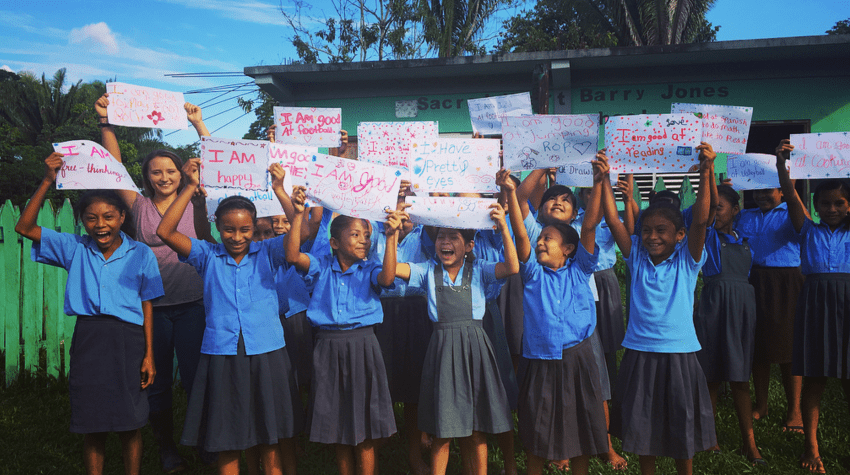Carleton College Among Peace Corps’ 2018 Top Volunteer-Producing Colleges
The Peace Corps announced that Carleton College ranked No. 13 among small schools on the agency’s 2018 Top Volunteer-Producing Colleges and Universities list. There are 12 Carls currently volunteering worldwide. This is the seventh year that Carleton College has ranked among the top 25 small schools.

CHICAGO – Today, the Peace Corps announced that Carleton College ranked No. 13 among small schools on the agency’s 2018 Top Volunteer-Producing Colleges and Universities list. There are 12 Carls currently volunteering worldwide.
This is the seventh year that Carleton College has ranked among the top 25 small schools. In 2017, Carleton also ranked No. 13 among small schools.
“Peace Corps service is a profound expression of the idealism and civic engagement that colleges and universities across the country inspire in their alumni,” said Acting Peace Corps Director Sheila Crowley. “As Peace Corps Volunteers, recent college and university graduates foster capacity and self-reliance at the grassroots level, making an impact in communities around the world. When they return to the United States, they have new, highly sought-after skills and an enterprising spirit that further leverages their education and strengthens their communities back home.”
Alumni from more than 3,000 colleges and universities nationwide have served in the Peace Corps since the agency’s founding in 1961. Three Minnesota schools rank as Top Colleges this year, earning the state the unique distinction of being among only eight states and the District of Columbia with three or more ranked schools. In 2017, the Twin Cities region ranked No. 7 among metropolitan areas with the highest number of Peace Corps volunteers, with 174 volunteers currently serving worldwide.
Grace Sassana ‘16, a native of Chicago, Illinois, is currently making a difference as a health resource volunteer in Belize. She credits the study abroad program at Carleton with giving her the tools and skills to serve in the Peace Corps.
“In a number of ways, Carleton helped me mentally and emotionally prepare for Peace Corps,” Sassana said. “Firstly, at Carleton, I was encouraged to go abroad, which I did twice – once to study traditional medicine in China and the second time to help run a mobile clinic in Panama with the Carleton Medical Brigades. These experiences prepared me to live in a different country and act with cultural awareness. From Carleton’s fast-paced 10-week terms, I developed time and stress management skills that helped me navigate a self-structured work environment and the many stressors of service.”
As an undergraduate, Sassana was involved with various organizations including the Mortar Board Senior National Honor Society, the Center for Community and Civic Engagement, and the Carleton Student Association. She also volunteered with Northfield Hospital and the local Humane Society.
“At Carleton, I was also required and encouraged to take a number of courses in various departments outside my major, such as Sociology and Women’s and Gender Studies, that promoted well-roundedness and a broadened worldview,” Sassana said. “Additionally, I was involved in several extracurricular groups, such as [the Wellstone House of Organizing and Activism] and [TRIO/Student Support Services] that fostered conversations surrounding social justice issues. I think the Peace Corps naturally also appeals to curious people who desire to be an agent for change in society.”
As a health resource volunteer in Belize, Sassana works with local teachers at a primary school to develop health lessons that educate and engage students and leads a gardening project to increase the accessibility of fruits and vegetables. She is also collaborating with a community health worker on a compost latrine project, which aims to prevent widespread water contamination, and reduce the incidence of diarrheal diseases. For Sassana, managing Girls Leading Our World (GLOW), a week-long empowerment camp for young women, has been a highlight of her service. Camp GLOW provides trainings and seminars on leadership, self-confidence, business, health, and other essential skills to young girls in the community. Recently, she has been working with community members on an event that will feature games, a health fair and a Maya cultural celebration.
“My experience as a Peace Corps health volunteer significantly influenced my career aspirations,” Sassana said. “Going into Peace Corps, I was pretty confident I wanted to pursue a career in veterinary medicine. After working in the health field in Belize for almost two years, witnessing the pervasive inaccessibility to the basic right of quality medical service, and being without the qualifications to assist, I now aspire toward a career related to women’s health and reproductive rights.”
The Peace Corps ranks its top volunteer-producing colleges and universities annually according to the size of the student body. Below find the top five schools in each category and the number of alumni currently serving as Peace Corps volunteers. View the complete 2018 rankings of the top 25 schools in each category here and find an interactive map that shows where alumni from each college and university are serving here.